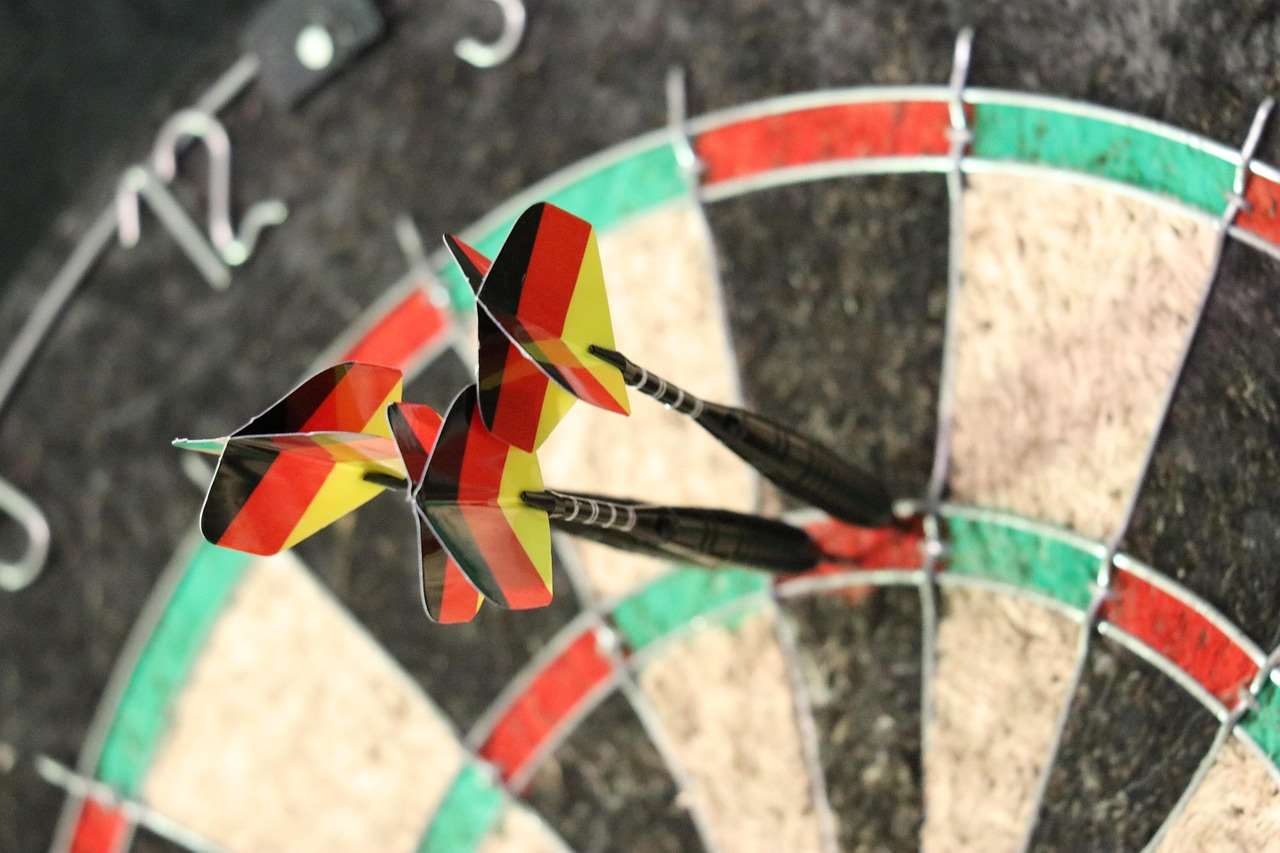Navigating the world of fantasy darts can be a thrilling experience, but it’s crucial to understand the Fantasy Darts Tax Implications of any winnings you might accrue; ultimately, the IRS views prize money as taxable income. This article will comprehensively explore the tax responsibilities associated with participating in fantasy darts leagues, covering everything from reporting requirements to deductible expenses.
⚠️ Still Using Pen & Paper (or a Chalkboard)?! ⚠️
Step into the future! The Dart Counter App handles all the scoring, suggests checkouts, and tracks your stats automatically. It's easier than you think!
Try the Smart Dart Counter App FREE!Ready for an upgrade? Click above!
Understanding the Basics of Fantasy Darts Tax Implications
When it comes to fantasy sports, including fantasy darts, the IRS treats any winnings as taxable income. This means that if you win money or prizes playing fantasy darts, you’ll need to report those winnings on your tax return. Understanding the nuances of Fantasy Darts Tax Implications is vital for staying compliant with tax laws and avoiding potential penalties.
The general rule is that all income, from whatever source derived, is taxable unless specifically exempted by law. This includes prizes won in contests, sweepstakes, and lotteries, which all apply to fantasy darts. Therefore, any money or the fair market value of prizes won while participating in fantasy darts leagues is considered income and is subject to taxation.

Reporting Fantasy Darts Winnings to the IRS
The way you report your fantasy darts winnings depends on the amount and how the winnings were paid to you. Here’s a breakdown:
- Winnings of $600 or More: If you win $600 or more from a single source (e.g., a specific fantasy darts league), the league operator is legally obligated to issue you a Form 1099-MISC or 1099-NEC. This form reports the amount of your winnings to both you and the IRS.
- Winnings Under $600: Even if you don’t receive a 1099 form, you are still required to report all your winnings, regardless of the amount. You’ll report these winnings as “other income” on Schedule 1 of Form 1040.
- Cash vs. Non-Cash Prizes: If you win cash, the amount is straightforward. If you win a non-cash prize (like merchandise), you need to report its fair market value.
It’s important to keep accurate records of your winnings throughout the year to ensure you can accurately report your income on your tax return. Neglecting to report winnings, even small amounts, could lead to penalties and interest from the IRS.
Can You Deduct Losses from Fantasy Darts?
One crucial aspect of understanding Fantasy Darts Tax Implications is knowing whether you can deduct losses to offset your winnings. The IRS allows taxpayers to deduct gambling losses, but only up to the extent of their gambling winnings. This means that if you have $1,000 in winnings from fantasy darts, you can only deduct up to $1,000 in losses.
Understanding the Rules for Deducting Losses
Here are some key points to remember when deducting losses from fantasy darts:
- You Must Itemize: To deduct gambling losses, you must itemize deductions on Schedule A of Form 1040. You can’t take the standard deduction and also deduct gambling losses.
- Losses Cannot Exceed Winnings: You can only deduct losses up to the amount of your winnings. You cannot use gambling losses to offset other types of income, such as wages or investment income.
- Accurate Record Keeping is Essential: You need to keep detailed records of your losses, including dates, amounts, names of the leagues, and any other relevant information. This will help you substantiate your deductions if the IRS audits your return.

For example, imagine you won $800 from a fantasy darts league but spent $500 on entry fees and other related expenses. You would report the $800 as income and could deduct $500 in losses, resulting in a taxable income of $300 from your fantasy darts activities. Understanding these details is crucial in properly navigating Fantasy Darts Tax Implications.
Record Keeping for Fantasy Darts and Taxes
Maintaining thorough records is paramount for accurately reporting your fantasy darts winnings and losses and ensuring compliance with tax laws. Good record-keeping can also help you maximize any potential deductions, ultimately minimizing your tax liability.
Essential Records to Keep
Here’s a list of essential records to keep related to your fantasy darts activities:
- Entry Fees: Keep records of all entry fees paid to participate in fantasy darts leagues. This includes the date of payment, the amount paid, and the name of the league.
- Winnings: Document all winnings, including the date received, the amount won, and the source of the winnings (e.g., the name of the league). If you receive a 1099 form, keep a copy for your records.
- Other Expenses: Keep records of any other expenses related to your fantasy darts activities. While these may not always be deductible, it’s good to have them documented in case regulations change.
- Payment Methods: Retain records of payment methods used for both entry fees and receiving winnings. This can help track your overall financial activity.
- Communications: Save emails or other communications from the league operators regarding winnings, fees, or other relevant financial information.

Use a spreadsheet or dedicated app to log your fantasy darts transactions. Regularly update your records to ensure accuracy. By keeping meticulous records, you’ll be well-prepared when it comes time to file your taxes and address any potential inquiries from the IRS. The better your record keeping, the more confident you can be about your Fantasy Darts Tax Implications.
Tax Planning Tips for Fantasy Darts Enthusiasts
Effective tax planning can help you manage your Fantasy Darts Tax Implications and minimize your tax burden. Here are some practical tips to consider:
- Track Your Winnings and Losses Regularly: Don’t wait until tax season to gather your financial information. Keep a running tally of your winnings and losses throughout the year to stay organized.
- Consider Itemizing if It Benefits You: If your itemized deductions, including gambling losses, exceed the standard deduction, it’s generally beneficial to itemize. However, carefully evaluate your situation to determine the best course of action.
- Consult a Tax Professional: If you’re unsure about how to report your fantasy darts winnings or losses, or if you have complex tax situations, consult with a qualified tax professional. They can provide personalized advice based on your specific circumstances.
- Be Aware of State Taxes: Keep in mind that state tax laws may differ from federal tax laws. Check your state’s regulations regarding the taxation of gambling winnings.

Remember, tax laws can change, so it’s important to stay informed and up-to-date on the latest regulations. Proactive tax planning can help you navigate the complexities of Fantasy Darts Tax Implications and ensure you’re making informed decisions.
Understanding the relationship between fantasy darts and betting can further contextualize potential tax liabilities. It’s crucial to differentiate between casual participation and professional gaming, as the latter may have different tax implications and reporting requirements. Keep in mind that the rules surrounding betting company logos on dartboards, player shirts, and sponsorship in major darts tournaments are separate from tax considerations, but they represent different facets of the darts ecosystem.
Common Mistakes to Avoid When Reporting Fantasy Darts Income
Even with careful planning, it’s easy to make mistakes when reporting fantasy darts income. Here are some common errors to avoid:
- Failing to Report All Winnings: This is perhaps the most common mistake. Remember that you’re required to report all winnings, even if you don’t receive a 1099 form.
- Not Keeping Adequate Records: Insufficient record-keeping can make it difficult to accurately report your income and deductions. Be sure to maintain detailed records of all your fantasy darts transactions.
- Deducting More Losses Than Winnings: Remember that you can only deduct gambling losses up to the amount of your winnings. You can’t use losses to offset other types of income.
- Forgetting State Taxes: Don’t overlook state tax requirements. Check your state’s regulations to ensure you’re complying with all applicable laws.
- Ignoring Non-Cash Prizes: If you win non-cash prizes, remember to report their fair market value as income.

By being aware of these common mistakes, you can avoid potential penalties and ensure you’re accurately reporting your Fantasy Darts Tax Implications. If in doubt, seek professional tax advice.
Conclusion: Mastering Fantasy Darts Tax Implications
Understanding the Fantasy Darts Tax Implications is essential for anyone participating in these leagues. Remember, all winnings are taxable income, and it’s crucial to keep accurate records of both your winnings and losses. You can deduct losses, but only up to the amount of your winnings, and you must itemize to do so. By following the tips and advice outlined in this article, you can navigate the complexities of fantasy darts taxes with confidence.
Stay informed, keep meticulous records, and don’t hesitate to seek professional advice if you need it. With a little planning, you can enjoy the thrill of fantasy darts without worrying about unexpected tax surprises. Take control of your Fantasy Darts Tax Implications today and ensure you’re compliant with all applicable regulations.
Hi, I’m Dieter, and I created Dartcounter (Dartcounterapp.com). My motivation wasn’t being a darts expert – quite the opposite! When I first started playing, I loved the game but found keeping accurate scores and tracking stats difficult and distracting.
I figured I couldn’t be the only one struggling with this. So, I decided to build a solution: an easy-to-use application that everyone, no matter their experience level, could use to manage scoring effortlessly.
My goal for Dartcounter was simple: let the app handle the numbers – the scoring, the averages, the stats, even checkout suggestions – so players could focus purely on their throw and enjoying the game. It began as a way to solve my own beginner’s problem, and I’m thrilled it has grown into a helpful tool for the wider darts community.